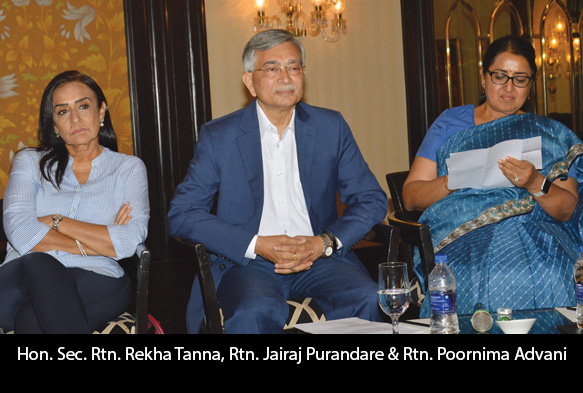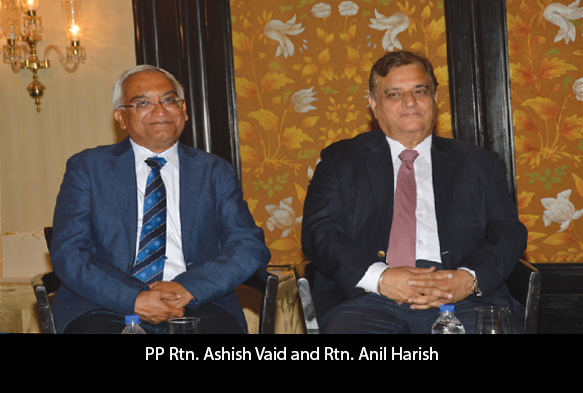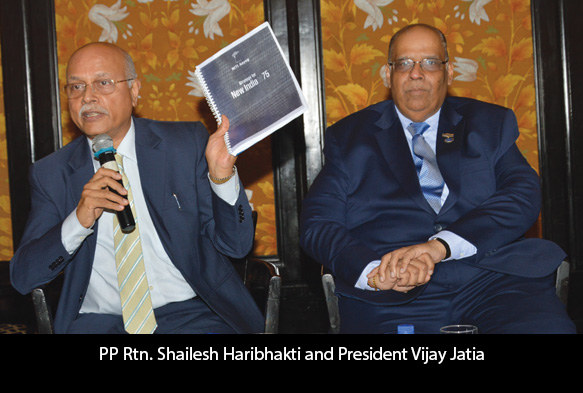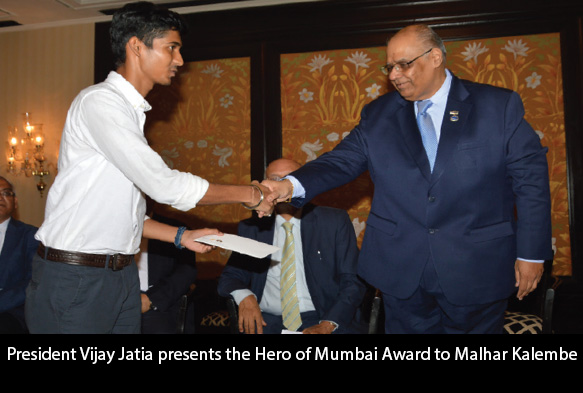
WE, THE PEOPLE
AN EMINENT PANEL OF ROTARIANS CHARTS AN URGENT AGENDA OF GROWTH FOR THE GOVERNMENT
Data-led governance
PP Rtn. Shailesh Haribhakti
There is a fantastic document that Niti Aayog has put together. To my mind, it creates an infrastructure of thinking. It is estimated that India will become one of the two largest economic nations on our planet by 2047 if the trajectory sought to be put together comes true.
The aspiration is to bridge the gap between public and private sector performance. It’s astonishing how the public sector has languished so far behind the private sector for so many years, in almost every outcome. It is the first time I have read in a public document, an acknowledgement of the fact, and some sort of action plan to change this. There are four components:
- Core things like employment, finance, housing, travel and environment.
- Infrastructure – power, transport, rail, civil aviation, waterworks, digital smart cities, Swachch Bharat.
- Inclusive education and health coverage across gender and for seniors. There is also a chapter for transgenders.
- Governance – ensure regional development in backward districts, and also North East India.
Civil services will be made accountable with outcomebased performance. There is data-led Governance. This is the key piece; 41 action areas have been outlined.
The emphasis is on technology and regulatory processes, measurements and corrections online. Compliance of the Sustainable Development Goals of the UN, measurements and rewards, Centre-State partnering, public private partnership, inclusion, adopt the best global practices so the wheel does not have to be reinvented.
There will be public accountability and ethical contact.
This is the context of what to expect from the budget. President Vijay Jatia has suggested we create a onepager from this discussion to send as a recommendation from us.
Make business productive
PP Rtn. Ashish Vaid
We have a strong government. Whenever we have written to them about policy matters or about any corrections to be done in the law, things happen. It takes a little time but there is a positive outcome so that is heartening. Short-term, they need to look at:
- Water: Use MNREGA to create local water bodies. Encourage villagers to dig up traditional ponds and lakes to trap rainfall. The drought is so severe that there are about seven farmer suicides daily. We must quickly scale up desilting of dams. The soil is rich in farming and can be used for an entire year.
- Financial sector: RBI should relax norms and reduce interest. If they do one big 1 % reduction rather than tinkering 0.25 % every time, it will boost the economy. Financial lending should be encouraged to good borrowers with good security cover including NBFCs.
- Manufacturing and trade: We need capital at low interest rates. Our current account deficit is in control, forex is strong, inflation is low. We need aggressive monetary policies that will cut interest rates further and create liquidity in banking.
- Export: Instead of fighting USA with retaliatory tariffs, identify Indian suppliers who can replace imports and provide good packages.
- Start-ups: We are losing start-ups to Singapore and we need to build a strong ecosystem here. We also need to double farm income from two to three crops in each taluka. New schemes of water conservation and augmentation should be introduced.
- Nationalise GST: There should be one GST across one industry. And there should be quick and timely implementation of refunds, especially for exporters.
- Ensure a fair price for farmers: The Gujarat Amul model or the Nashik farmer-producer model can be adopted. A good MSP (minimum selling price) can be fixed. Better infrastructure is needed to ensure farm produce reaches its destination in the shortest possible time. Timely payment to farmers will help.
- Ease of doing business: World Bank released its ease of doing business report. India has jumped 23 positions against its rank of 102 in 2017. We are now at 77th position among 190 countries assessed by World Bank. However, the ground reality is different. Today, 50 % of productive time is spent complying with Income Tax, TDS, GST, etc. Things need to be simplified to make business productive. If the GDP goes up, employment rate will go up too.
Empower women
Rtn. Poornima Advani
The immediate issue, as Ashish said, is drought. This needs to be tackled at the earliest. Long-term measures have to be initiated too, within these hundred days. The three most important aspects for our country today would be: 1) Economy 2) Security 3) Social needs.
The current down phase has to be tackled. There is a multiplicity of laws – they need to be implemented more smoothly but the current down-trend in the economy has to be taken into consideration. Immediate measures will be required. The slowing of the economy is on both the consumer as well as the investment front.
Another area of serious concern is high debt. Banks are not willing to lend which jeopardises national projects. The government may consider initiating investment measures because that is where employment can be generated.
The Land Acquisition Act is, as of now, extremely populist. It is not going to permit a large number of infrastructure measures that the government can and would want to contemplate in the years to come. Therefore, a hard look at the Land Acquisition Act is imminent.
Labour: Employers are increasingly choosing the contract system and, therefore, regular income is denied to many. For example, even the Chennai Municipality wants to employ women as contract labourers. There can be no regular employment unless the employee-friendly aspect of labour laws is taken into consideration.
Next is security, both external and internal. External relations’ prime concern is always Pakistan, China and some of the neighbouring states. Internal is about equipping our defence forces. This is the first time that we have a finance minister who has experience in Defence, Commerce and in the Ministry of Women and Child Development.
There is a need to empower women. Women form 30 % of the workforce, if not more. This 30 % is paid 30 % less than men doing the same work. Unless health, hygiene and employment improve, things for women will remain just the same. I hope the budget also announces implementation, in a simplified form.
Wish list for a new India
Rtn. Anil Harish
New India is the one where the woman is in charge of finance, and the man is in charge of home. It is for this new India that we have a wish list.
Lower tax rates in finance. Tax rates in the past were very high, so there is high regulation of license, procedure and inefficiency of officers.
Black money and corruption should be wiped out. But, a few years ago, the Black Money Act was introduced whereby a person with even a small amount of black money is troubled. Everyone makes mistakes. For instance, the steps in front of the Mantralaya were made and then demolished. So, the government made a mistake and they corrected it. You have to forgive and forget it. Maybe you can forgive, with a penalty, but you need to go on. We need that kind of financial system.
The Foreign Exchange Management Act was introduced in India on September 2nd, 1939 at the outbreak of the Second World War. It is not relevant today as we have enough reserve. Another thing to be careful about is law delay. A person has been coming to me about his raid matter since September 1983. The prosecution dropped the case only two years ago. They still have not got their jewellery back. It’s been 36 years!
Many years ago, our Rotary Club had started a number 105 to call an ambulance. Now, one can call 100 for the police but we need a 911 number like the US. Anyone in distress, whether a woman or a child, should be able to call a number
and get a response from the appropriate department. These are some of my wishes for the new Government.
Jump-start the economy
Rtn. Jairaj Purandare
The Government has come in with a strong vote and clear majority in Lok Sabha. But one needs to understand the
current challenges:
- Low Growth: this depends upon government expenditure, private expenditure, investment and net export. So, if we want to boost GDP growth, then the government has to focus on these areas.
- There is no pick-up in private investment and consumption is low. One of the reasons is that government expenditure is low compared to past years.
- Rural distress.
- Government-owned banks, PSU banks are still dominant. 90 % of bad loans are in PSUs. 5. Foreign capital inflows have fallen to 2002 levels.
We need better governance and transparency. Our other external challenge is our dependence on oil import. It is a risk to growth. We need to jump-start the economy. The quickest way to do this is to boost consumption. The government can do that very easily at the beginning of its fiscal year. The budget, which is around the corner, may
enhance some of these areas.
Legal reform is a big area. Tax incentives can be used to encourage FDI. Simplification is important in indirect taxes and GST. Create certainty so that people will invest. There is a war going on between the United States and China and companies are thinking of moving out of China. India must use that opportunity.
There is going to be a lot of focus on urban infrastructure projects. The election manifesto talks about spending Rs 100 lakh crore on infrastructure projects.
Public sector banks need reform. NBFCs need liquidity and hopefully we will see some easing there. The insolvency code needs work.
Digital economy is a great opportunity as we have 800 million mobile users. This database can be used effectively. But we are still way behind China and the US when it comes to artificial intelligence, block-chain, data analysis and machine learning. There is another big opportunity in the digitisation of data and processes. For example, if land records are digitised then corruption can be reduced. Digital tax is something that we should expect.
Create an Ease of Living Index
PP Rtn. Shailesh Haribhakti
The first set of thoughts is on taxation. How do we get a simple tax system? For direct tax, I recommend just three rates: zero tax for anybody earning Rs 5 lakh, 12.5 % for those between Rs 5 to 12.5 lakh, and 25 % as the top tax rate promised by Arun Jaitley. I am almost certain this will happen.
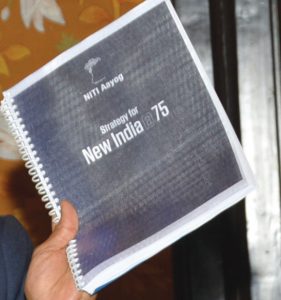 In GST, again, we need only three rates: zero rate for essential goods, 12.5 % for the general rate and 17.5 % for the top rate. And, a totally digitised assessment which is on the cards. There are at least 10 jurisdictions in the world where you don’t have to file any tax return. Tax is determined by your financial footprint calculated by Thomson Reuters, the largest tax provider in the world.
In GST, again, we need only three rates: zero rate for essential goods, 12.5 % for the general rate and 17.5 % for the top rate. And, a totally digitised assessment which is on the cards. There are at least 10 jurisdictions in the world where you don’t have to file any tax return. Tax is determined by your financial footprint calculated by Thomson Reuters, the largest tax provider in the world.
Disinvestment: we need five waves of disinvestment. The government wishes to raise Rs 90,000 crore from disinvestment proceeds this year. It can happen only if we sell all the loss-making units.
Divest to the people of India – that is another thought that Niti Aayog has put together. Why shouldn’t we, the people of India, not own an ONGC, with small shareholders all over the country and with the same governance practice
as practiced by a TCS. Standards of governance in PSUs are not the same as in corporate India and that has attracted attention. Why not strategic disinvestment?
Sharpen and retain the inclusion programme: MNREGA, Pradhan Mantri Awas Yojana, Housing For All by 2022, and Rs 6,000 that will be dispersed to every farmer this year. This will cause the consumption story to get kick-started. States are now competing who will be the first to disperse the amount.
We need to switch from the Ease of Doing Business to Ease of Living for each citizen. That is the new construct that this government, hopefully, should be putting into place. There must be a sharp increase in the thrust of digital governance.
Create long-term money for infrastructure finance. Government of India cannot continue to empower all the infrastructure in India. It is very important we get an enabling environment for long-term debt, which sovereigns, high net worth individuals, family offices can invest in, through credit enhancement provided by the government.
If these things are put in place, along with the suggestions of my fellow Rotarians, I think we have the formula for putting India on track to becoming the second-largest economy of the world.

